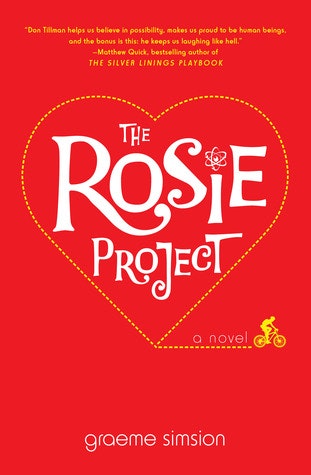The Rosie Project

Do Don’s Asperger’s conditions help him or hinder him? Does Don’s having Autism offer any advantages in his life?
Don gets in trouble with the dean for using the genetics lab for his personal project with Rosie. Is it ever okay to break the rules in order to help someone?
Don goes through a number of spectacularly bad dates. What have been some of your own dating nightmares?
Do you feel happy for Don when he “eliminates a number of unconventional mannerisms” (p. 268) in order to win Rosie, or has he lost something?
Where do you fall on the spectrum between structure and chaos in life? Are you highly rigid in your routines or very relaxed?
Does Gene get his comeuppance?
Do you agree with Don’s assessment that “humans often fail to see what is close to them and obvious to others”? (p. 88)
Were you surprised at the ultimate revelation of Rosie’s biological father? Did you suspect someone else?
What do you think of Gene and Claudia’s relationship? Do you know anyone in an open marriage? Can it work?
After his lecture on Aspergers, Don confronts Julie with what he considers her lack of understanding: earlier, she obliquely refereed to Aspergers as a "fault"—as in "[it's] something you're born with. It's nobody's fault." She also worries that the nickname "Aspies" will get "them thinking it's some sort of club." How do Don and Julie view Aspergers? Do you agree with Don's approach...or Julie's?
Don says that the happiest day of his life was spent at the Museum of Natural History. Do you have a happiest day of your life? Or is there a special place where you are happiest?
Follow-up to Question 12: Don comes to see that morality and ethics are nuanced. What brings him to this point? And is morality nuanced? Is there such a thing as a purely moral/ethical stance, as Don has, up to this point, always believed?
As Don’s affection for Rosie grows, he becomes aware of his instincts overriding reason. What is the role of instinct versus reason when it comes to choosing a life partner?
Don accuses Gene of being just like him. One would hardly consider Gene autistic, so what does Don mean? In what way are the two men similar?
Do you have anyone on the Autism spectrum in your life?
SPOILER ALERT: Don comes to the realization that he loves Rosie. Does he? Is he capable of the same kind of love as those of us feel who are low on the autism spectrum? Don realizes he feels happiness with her...is that the same as love? Or is his concept of love—compatibility and pleasure in each other's company—a better basis for marriage than deep feelings? Will Don's love, or his idea of love, be satisfying for Rosie over the long haul? What do you think?
Don watches a number of movies to try to learn about romance, including When Harry Met Sally, The Bridges of Madison County, An Affair to Remember, and Hitch. What are your top five romantic movies?
SPOILER ALERT: Follow up to Question 17: Don has autism. How would you rate the chances for a happy marriage between Don and Rosie? What problems might they encounter? Is the book's ending overly optimistic, too much like a fairytale? Or is the ending based on optimism tinged with realism?
Have you ever had a moment of breaking out of your routine and opening up in a significant way? Or has someone broken through your routine for you?
Overall, talk about the changes that Rosie precipitates in Don? In some ways, this novel can be seen as an adult coming-of-age story. How does Don grow over the course of the novel...not just the changes in his appearance or social behavior but in his essentials?
Is it smart to have a list of criteria for a potential partner or is it limiting?
